- Home
- Lynne Connolly
Danger Wears White Page 2
Danger Wears White Read online
Page 2
Recollecting his usual life helped to keep the dizziness at bay. The only big house this close was the one he’d headed for with a particular aim in mind, so although he hadn’t banked for someone shooting at him, he had achieved his objective of getting inside the house. Even worse that he’d enter it as a guest, when he’d planned to enter it as a thief. He tried to smile, but feared it turned into a grimace. “What’s wrong?”
“You’re a Jacobite,” she whispered, dread in her tones.
Tony fixed all his attention on her face. She’d gone white, and she was staring wide-eyed at him. He couldn’t tell if she was appalled or awed. Which? Was she a loyalist to the Crown or a rebel? He wouldn’t agree to or deny her statement. Since he’d hoped the cockade would get him into the house via the servants’ entrance, he couldn’t be sorry she had seen it. “Does that give you a problem?”
“The magistrates will hang you if they find you with one of those things.” She nudged the piece of white ribbon with her foot.
“You’ve seen a lot of these hereabouts, haven’t you?”
“Yes.”
At least she didn’t deny it. Jacobites riddled this part of Lancashire. Most of them were licking their wounds after the defeat of the ’Forty-five. Others considered it a setback and carried on with their plotting.
By inserting himself in their midst, Tony anticipated discovering more about the plot that threatened his family, irritatingly known as the Emperors of London. His own name explained the reason for the sobriquet. Antoninus. Damn stupid name. His brother, Nicephorus, was another example of their mother’s warped sense of humor.
For the first time in months, Tony felt alive. The edge of danger in this self-imposed assignment gave him a thrill he thought he’d left behind.
Not to mention a pretty servant girl.
But Emmy was more than pretty. She was stunningly beautiful. An appropriate description, considering the circumstances. He didn’t know if she was aware of the effect of her exquisitely pointed chin and her liquid brown eyes. If anything, the cloud of dark hair at present untidily straggling down in tails and curls only acted as a frame. And he wasn’t being partial, even though when he’d first opened his eyes to see her he’d wondered if angels had brown eyes. If he’d said it, she’d probably have left him, and he didn’t fool himself. He’d come close with this one.
He glared at the blood he’d left on the floor. Weakness filled his bones. He could use a good night’s sleep before he got to work.
Emmy took his elbow, and he felt the same jolt of awareness that he had when she’d touched his head. That had come as a profound shock. Women had a place in his world, but here and now, he didn’t have time for that. Unless he’d found an ally.
Hurting someone who’d done nothing but help him went against the grain. From the way she was dressed, in a drab riding habit that had seen better days, and her attitude, with no maidenly modesty, he’d guessed she was a servant at the house.
Tiredness swept over him in a swamping wave. He still couldn’t believe he’d nearly ended here, in the English countryside instead of one of the battlefields of Europe. The vagaries of fate never failed to amaze him.
When he moved, he staggered, and he decided against picking up the cockade. Instead, he scuffed it into the ground with the toe of his boot. His valet would probably faint dead away if he saw what Tony was doing with the boots meant to grace Hyde Park. Well, they were good boots, and they deserved a better fate than prancing around town.
“In truth, I don’t think I could go much farther today,” he said, passing a hand over his forehead. The dramatic gesture wasn’t altogether undeserved. Heat washed over him and he knew from experience that was part of his condition. A soak in a bathtub to get all the dirt out of his wounds and a good night’s sleep would see him right. If he was fortunate, he’d get one of those.
He was damned lucky not to have suffered a broken bone. That bullet had come out of nowhere and he’d only had time to jerk to one side before it struck. The retort and the pain weren’t that far apart, so his attacker must have been close. A footpad? Maybe, but he hadn’t been robbed, and the ruffian had every opportunity to do so. He’d lost the contents of his saddlebags, but only because the horse had bolted.
No, someone had shot him for a different reason. The devil was, he didn’t know which one. Either because he was a Jacobite, or because he wasn’t. At the last inn, he’d ensured the landlord had seen the cockade when he’d asked for directions, so maybe the innkeepers weren’t pleased to see him. Certainly, the nag he’d allowed the landlord to fob him off with wasn’t the sprightly mount the landlord had promised. A lively mount, but only when a bullet zipped past its ear.
A mile wasn’t too far. Not when he’d been lying in that run-down hut for the best part of a day, blood seeping out of him. He’d been unconscious for half of it, and when he’d woken, one movement had told him his head was broken and he’d swum in and out of consciousness.
He had to get to shelter, whatever that was. Now he pushed away from the wall that threatened to collapse under his weight and took a step toward Emmy. “Shall we go?”
Unfortunately, he’d lost his practiced manner. He stumbled, and his words came out as a definite drawl. Like he’d been drinking French brandy all night. His head felt the same, full of heavy syrup.
Cursing to himself, he let her lead him out into the sunshine.
When had it stopped raining? During his ordeal, part of him had welcomed the rain as a way to irrigate the wound, but it had turned chilly, and he feared he might shiver himself to death. A horse stood outside, calmly cropping the grass. It had good bones but signs of age. Black with a white blaze on its forehead that vaguely resembled a white cockade. Appropriate. It was probably called Charles or James.
“I think you should ride the mile to the house,” she said.
“Dear lady, I wouldn’t dream of depriving you of your gallant steed.”
She turned to face him, studying him with a frankness that in other circumstances he’d enjoy. “I fear that if you don’t use the horse, you will fall over. I can’t pick you up. You are far too heavy for me.”
Yes, he was, and she was right. But she’d patched him up, so he wasn’t in danger of bleeding to death. A mile, she’d said. Hardly any distance at all.
But every step felt like he was lifting a ton of weight.
She walked toward a tree stump at the corner of the field. “You can mount here.”
“I don’t need a tree stump.” At times in his life, he’d lived on horses. Slept on them too. He could mount an average-sized docile gelding. Besides, the walk seemed too far. Grabbing the reins, he put his foot in the stirrup and prepared to swing his other leg over the saddle.
Except when he pushed up, something happened to his head, and while he gave his free leg the order to lift, it didn’t want to obey him.
The dizziness overwhelmed him, the grass becoming even greener, spinning, as if the horse had taken off and was cantering in circles. Just a rest, and then he’d complete the action.
Black edges at the corners of his eyes warned him what would happen next. With a silent prayer that he wouldn’t be unconscious for long, he fell forward, slumping over the saddle.
Chapter 2
“Miss Imogen, your lady mother will be expecting you. Shall I take the…” Young George’s voice trailed off when he saw the burden Blackie was bearing.
Silently, Imogen opened her hand to reveal the scuffed, filthy white cockade. “I found him in that run-down hut near the highway. He’s been shot, George.” She wasn’t above using the loyalty of the Georges, young and old, especially now. She’d waited until the stable lad had run from the yard, probably, considering the hour, in search of his dinner, before she’d led Blackie around the corner and into Young George’s view. “Quick, George, help me get him out of sight.”
Young George touched his forelock. “Yes’m.’”
Not for the first time, Imogen had cause to be glad of Young George’s towering height and overpowering strength. Over six feet with a huge frame, he nevertheless could be quick when the occasion demanded it.
She knew exactly where she would take her captive, and she headed for a corner of her house, key in hand. Unlocking the small door, she waited impatiently for her servant to catch up.
Young George lifted Tony off the horse as if he weighed no more than a lamb. Tony flopped over Young George’s shoulder. All the way home, Imogen had paused to check the pulse in Tony’s wrist, terrified that utter collapse meant he would never wake.
He might be a Jacobite, but she meant him no harm, and if she’d left him there or informed someone in authority, they’d have locked him up. He’d have taken prison fever in a week. She couldn’t have lived with herself if that happened.
Imogen opened the door and waited for Young George to step through before she relocked it and dropped the key in her pocket. She followed him up the narrow wooden staircase that led to the highest room in the house, the Long Gallery that stretched across the front of the main building.
Imogen had avoided the courtyard, because the parlor overlooked it and her mother might be already there, foot tapping, waiting for her daughter’s tardy presence. What Imogen had imagined as a leisurely hour to wash and ready herself for dinner would turn into a frantic ten minutes with cold water from that morning and the first gown she could lay her hands on.
But she had rescued someone.
The Long Gallery was of a piece with the rest of the house. One of the Thanes in the past, when they’d been country squires with not a title in sight, had seen an elegant long gallery in one of the large aristocratic houses being built at the time and decided he wanted one, too. But not as long and not as high.
She kept the gallery free of all but a few pieces of furniture, something she was glad of now, because Young George had less to trip him. A shame her sixteenth-century ancestor hadn’t used weathered wood because this place didn’t have one straight line in it. Successive owners had to practice constant make do and mend as the timbers had warped and twisted, and now the Long Gallery resembled the deck of a ship, one that had seen more than a little action. The warped boards were patched and the worst places covered with rugs, but every spot of the long room shone and gleamed with careful polishing. If Young George hadn’t known the vagaries of the gallery, he’d have stumbled. As it was, he carried his burden carefully around the more prominent of the gaps and jutting floorboards.
Halfway down the gallery, they paused. Young George shifted Tony’s weight, but not because it bothered him. Imogen had seen him carry a heifer five miles with no discomfort, so he could manage a man. It was to prepare them for the next part of their journey.
Very few people knew this secret. When Imogen had discovered it, she’d stood amazed.
Now she pushed open a panel, revealing a room, the upper half abutting onto the gallery. When the owner had built the Long Gallery, a room from the old part of the building, the wing leading up to the gatehouse, had inconveniently abutted at the wrong height. So instead of demolishing or reconstructing, he’d merely blocked it off. Although it had formed a secret room, it wasn’t meant that way when first built.
Imogen used to jump down the four feet to the floor of the secret room, but Old George, Young George’s father, had discovered her playing one day, and later he’d made her a set of stairs, so she didn’t have to jump and risk breaking her ankle. At the time she’d scoffed, but secretly warmed to the old man’s concern.
Now she was profoundly glad of the rudimentary steps. She went down first, waiting for Young George to pass his burden to her. He didn’t, but held Tony in his arms as he scrambled through.
The bed here must have been blocked in with the room. It was too large to have passed through the small opening. Not as large as the one in her room, but not a narrow cot, either. Big enough for a man. She’d stored some old sheets in the chest pushed against the wall, ones she had darned instead of throwing out. While Young George stood patiently, head bowed because of the low ceiling, holding the still unconscious Tony, she hastily made the bed and threw a blanket and quilt over it.
“Can you strip him, George? All but his shirt and drawers,” she added. “His clothes are filthy and his wounds need bathing.”
“Best to leave him awhile, miss,” Young George said. “I’ll strip him all right and put him to bed. Best you get off and change. Your lady mother will be sending for you if you don’t go.”
She’d return later. “Can you bring some water up?”
“I’ll do that for you, miss.”
Ah yes, the cockade. Imogen pulled it out of her pocket and tossed it on the chest where she kept the blankets and sheets. It was grubby now, since he’d ground it into the dirt, creased but still recognizable as the symbol of the Jacobite. What a stupid man to carry this about his person! But they did, so they could recognize each other. Young George would tell nobody.
Reluctantly, she left the room and scurried along the Long Gallery in the direction of the passageway that led to the main part of the house, and her bedroom.
After a perfunctory wash, she brushed her hair and twined it into a knot at the top of her head. After she had dropped her wet riding habit and boots on to the floor and scrambled into hoops, petticoat, gown and satin shoes, Imogen considered herself ready for dinner. Powdering her hair and applying the face paint her mother considered proper would have to wait. She only remembered to snatch up her fan and lace-edged handkerchief as she was leaving the room.
A London lady would consider her gown hopelessly outdated, but Imogen couldn’t help that. She hadn’t visited Lancaster in—goodness, nearly a year!
Maybe she should think about visiting her dressmaker and ordering a gown or two. Hurtling downstairs, she nearly came a cropper on the narrow wooden staircase at the end of her corridor and had to grab the worn banister rail to steady herself. With a silent prayer that nobody had heard the clatter, she crossed the hall to the drawing-room.
More people than she had expected turned to watch her entry. Covered with confusion, Imogen settled for a curtsey. “Good afternoon,” she said.
“Good afternoon,” a stranger said in a softly cultured voice. She lifted her chin and stared into a pair of gray eyes crinkled at the corners with amusement.
Damn, they’d heard her. The only thing she could do was pretend it hadn’t happened.
She rose as gracefully as she could manage and held out her hand. He bowed over it, far too deeply for comfort. The depth of the bow indicated the rank of the person being addressed, and he’d almost touched the polished wooden floor when he performed his obeisance. Of course he might be demonstrating his poise.
He was dressed in velvet and brocade, dark red the main color. He looked magnificent, especially compared to her well-worn apple-green silk. No awareness of her admittedly dowdy appearance showed in his face, and his fine eyes showed nothing but warm regard. He straightened. He was six feet or just over, and handsome, with smooth skin and a well-shaped face.
Her mother drifted forward, her silks rustling. Imogen suppressed a sigh when she recognized another new gown. Unlike Imogen, her mother visited Lancaster on a regular basis. This pretty embroidered pale blue had probably cost a field’s worth of barley. She’d ensure the carriage lost a wheel so her mother could not get into town for the next month or two. Her mother had a room full of gowns she’d worn perhaps once.
“My dear, may I introduce you to the son of an old friend of your father’s?”
Imogen released another inward sigh as her heart plummeted to her shoes. Goodness, she’d turn into a gust of wind if she sighed much more. She forced a smile of welcome.
“My dear, this is Lord William Dankworth, the son of the Duke of Northwich. Your father knew his father in Italy. Your lordship, I have the pleasure of introducing my daughter, Imogen.”
Oh, yes, Italy, where her father had given away every penny of his inheritance that he could get his hands on. All for a man who didn’t care about them, would probably not remember their names if repeated back to him. For her father was a devotee of James Stuart, known in some quarters as the Old Pretender and in others as King James III. And, of course, his sons.
Imogen refused to have anything to do with any of it. She had little left to give, and she was determined to keep hold of it.
Keeping the smile fixed on her face, she led the way to the fire and greeted her neighbor, Sir Paul Reeves, and his sister, Amelia. Paul had long been a suitor of hers, but she suspected he was more interested in her land than her body.
For it was hers. Her father had been forced to leave it to her, because of the terms in her grandfather’s will. Otherwise, she’d be sleeping in a ditch somewhere, Thane Hall gone with everything else. Her house was all that was left of a once considerable inheritance and respected title. Now, the title in disgrace and most of the property gone, Imogen remained determined to hold on to what she had left.
Receiving an exalted person like the son of the Duke of Northwich meant one of a few possibilities. Either he was breaking a journey, as he claimed, or he’d come with some other purpose. If he tried to recruit her to the Cause, she’d send him away with little more than a flea in his ear.
That determination made her greet Paul with more than her usual friendliness. And Amelia, a shy woman in her early twenties who enjoyed nothing more than a quiet dinner at a friend’s house, was always welcome.
“I have ventured to invite Lord Bartlett to join us,” her mother said. “He will be here directly.”
Lord Bartlett had a much tidier fortune and clearly adored Imogen’s mother, but she wouldn’t have him.
The man in question arrived on the heels of her mother’s announcement, so Imogen greeted him with her customary kiss on the cheek, ignoring Paul’s disapproving stare.
Lord William led her in to dinner, and they followed her mother. By rank, he should have escorted her mother, but she had given a tinkling laugh and announced that they didn’t stand on ceremony here.

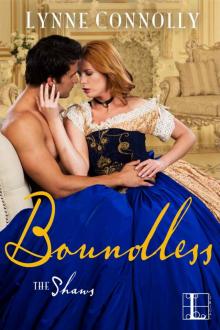 Boundless (The Shaws)
Boundless (The Shaws)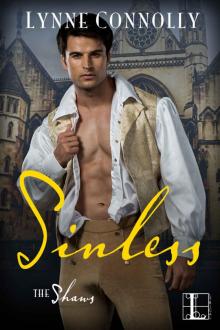 Sinless (The Shaws)
Sinless (The Shaws) The Girl with the Pearl Pin
The Girl with the Pearl Pin Hosts to Ghosts Box Set
Hosts to Ghosts Box Set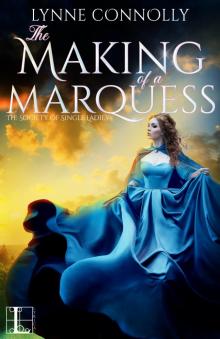 The Making of a Marquess
The Making of a Marquess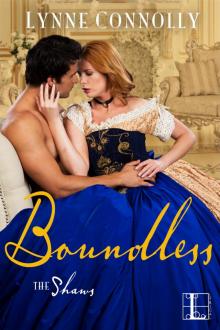 Boundless
Boundless Beauty of Sunset
Beauty of Sunset Virginia And The Wolf
Virginia And The Wolf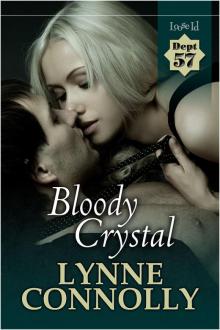 Department 57: Bloody Crystal
Department 57: Bloody Crystal Temptation Has Green Eyes
Temptation Has Green Eyes Forged by Love: Even Gods Fall in Love, Book 4
Forged by Love: Even Gods Fall in Love, Book 4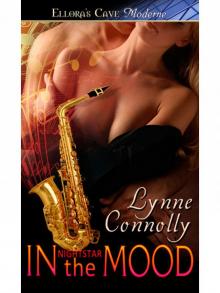 IntheMood
IntheMood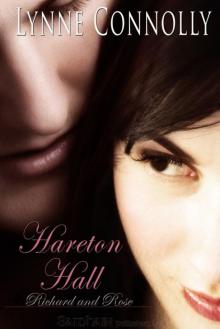 Hareton Hall: Richard and Rose, Book 6
Hareton Hall: Richard and Rose, Book 6 ShiftingHeat
ShiftingHeat Rendezvous at Midnight
Rendezvous at Midnight Yorkshire: Richard and Rose, Book 1
Yorkshire: Richard and Rose, Book 1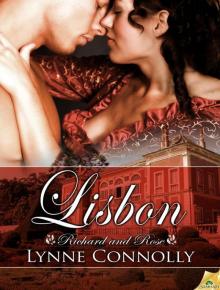 Lisbon: Richard and Rose, Book 8
Lisbon: Richard and Rose, Book 8 Devonshire: Richard and Rose, Book 2
Devonshire: Richard and Rose, Book 2 Venice
Venice War Chest: Even Gods Fall in Love, Book 5
War Chest: Even Gods Fall in Love, Book 5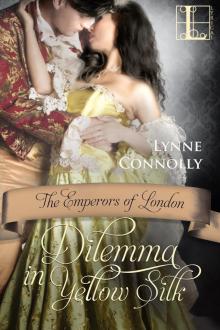 Dilemma in Yellow Silk (Emperors of London)
Dilemma in Yellow Silk (Emperors of London)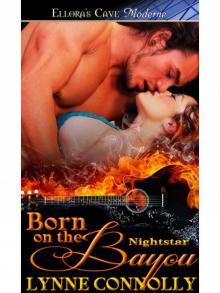 BornontheBayou
BornontheBayou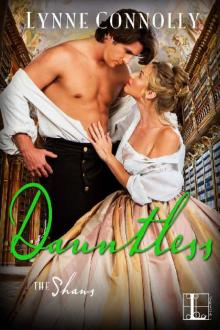 Dauntless (The Shaws)
Dauntless (The Shaws) Brutally Beautiful
Brutally Beautiful Lightning Unbound: Even Gods Fall in Love, Book 1
Lightning Unbound: Even Gods Fall in Love, Book 1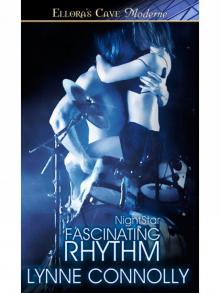 FascinatingRhythm
FascinatingRhythm Fearless
Fearless A Chance to Dream
A Chance to Dream Mad for Love: Even Gods Fall in Love, Book 2
Mad for Love: Even Gods Fall in Love, Book 2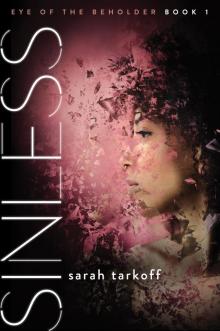 Sinless
Sinless SailtotheMoon
SailtotheMoon Wild Lavender
Wild Lavender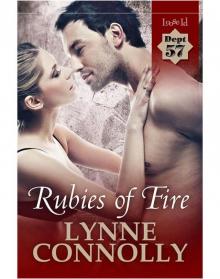 Department 57: Rubies of Fire
Department 57: Rubies of Fire Maiden Lane
Maiden Lane Harley Street
Harley Street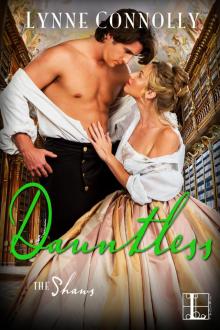 Dauntless
Dauntless NicenEasy
NicenEasy It Started at Waterloo
It Started at Waterloo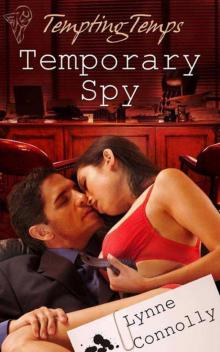 Temporary Spy
Temporary Spy BorntobeWild
BorntobeWild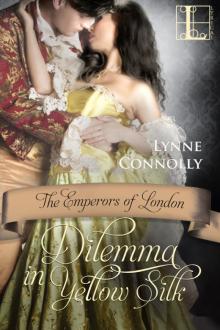 Dilemma in Yellow Silk
Dilemma in Yellow Silk Yorkshire
Yorkshire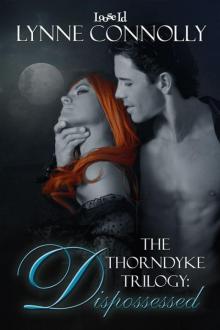 The Thorndykes 1: Dispossessed
The Thorndykes 1: Dispossessed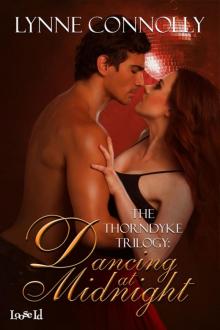 The Thorndyke Trilogy 2: Dancing at Midnight
The Thorndyke Trilogy 2: Dancing at Midnight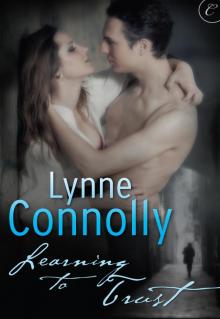 Learning to Trust
Learning to Trust Her Quicksilver Lover: Even Gods Fall in Love, Book 6
Her Quicksilver Lover: Even Gods Fall in Love, Book 6 Loving Lucy
Loving Lucy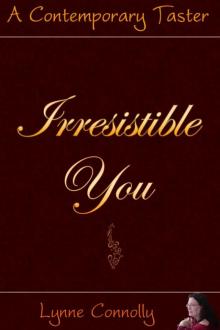 Irresistible You
Irresistible You Arrows of Desire: Even Gods Fall in Love, Book 3
Arrows of Desire: Even Gods Fall in Love, Book 3 Unbroken
Unbroken Devonshire
Devonshire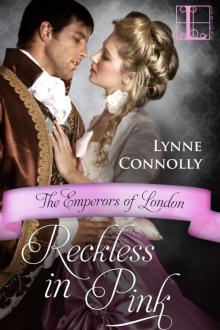 Reckless in Pink
Reckless in Pink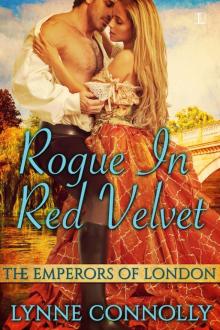 Rogue in Red Velvet
Rogue in Red Velvet